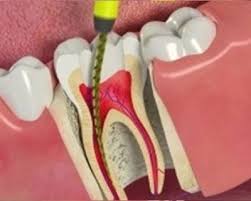If your tooth has a significant cavity, you may require root canal treatment. This common dental procedure eliminates bacteria, infected tissue and nerves from the affected tooth.
Root canal therapy eliminates infection at its source and eliminates pain, so you can feel better quickly. If you’ve experienced any tooth discomfort or swelling, contact your dentist right away for assistance.
It is painless
If your tooth is infected, root canal treatment is the most effective way to combat infection and save its structure. This dental procedure removes infected tissue, cleans out canals, and seals off the area against further spread of germs and bacteria.
Your dentist will numb the area with local anesthesia to make the procedure comfortable. If you experience high levels of dental anxiety, they may also suggest sedation as a possible option.
Additionally, pain relief medications such as ibuprofen (Advil, Motrin) and naproxen (Aleve) can be prescribed to ease any discomfort after the procedure.
After the treatment, most people report feeling numb in the tooth for several hours. Most people can return to work or other activities immediately following the procedure.
Your tooth may feel a little sensitive for a few days after the procedure, but this should subside as the nerves heal. Over-the-counter pain relievers can help with this and it is best to avoid eating crunchy or hard foods since they may cause discomfort or damage the treated tooth.
After root canal treatment, it’s essential to keep your tooth clean and free of infection. Brushing twice daily and flossing once daily are the best ways to ensure good oral hygiene following this type of procedure.
Maintain the health of your mouth and prevent future issues by visiting your dentist in Noida regularly for check-ups. Doing this allows them to detect any potential issues early and take the necessary steps for their correction.
Once your dentist determines you need a root canal, they will begin by extracting any decayed or damaged tissue and drilling an access hole into the affected tooth.
A dentist will use a series of files to carefully remove infected tissue, bacteria and pulp. After disinfecting with water or sodium hypochlorite, they clean out and disinfect the area.
After this, a filling is placed into the root canal to seal it off and restore full function of the tooth. Finally, you may choose to place a crown or other restoration to protect it, restore its function, and keep it for years to come.
It is affordable
If you are experiencing tooth pain or sensitivity, root canal treatment may be the best solution. This procedure removes the infected pulp from your tooth and helps protect against further damage. However, be aware of potential risks involved with this procedure.
Floss Dental is one of Noida Extension’s premier dental clinics, boasting highly trained dentists who use cutting-edge technology. Their rates are competitive and they offer a wide range of dental treatments at reasonable costs. Most importantly, their team of doctors strive to provide you with exceptional service while making sure you feel comfortable and relaxed during your visit.
Root Canal Therapy in Noida is an effective solution that can relieve your pain and save your tooth. This involves extracting the infected pulp of your tooth, cleaning and shaping its root canals, then filling them with gutta-percha – a rubbery material similar to gutta-percha. Once these canals have been cleaned out, your dentist will place a crown over it to protect and restore its function.
When having a root canal treatment, your dentist will inject you with local anesthesia to numb your gums. This makes it easier for them to work on the tooth’s nerve-rich pulp.
Once the anesthesia has worn off, your dentist will carefully extract the infected pulp from your tooth. This allows them to clean out all bacteria and tissue surrounding it.
The procedure is quick and painless. To minimize any risks, it is advised that you follow a liquid diet and only consume soft foods for 24 hours after your treatment.
Additionally, keep your teeth clean and abstain from tobacco and alcohol. These two things may contribute to any numbness you experience after receiving treatment.
Additionally, it’s important to visit your dentist regularly for check-ups and treatment. Doing so can help them detect any problems early and provide prompt attention.
If you have health insurance, they may cover the cost of your root canal treatment. However, if not, then you would likely need to cover it out of pocket.
For affordable root canal treatment in Noida, look no further than Floss Dental. They have two locations and their staff is highly trained and experienced in this field. Additionally, they provide a range of other dental services like emergency care or cosmetic dentistry.
It is quick
If your tooth is infected, root canal treatment from your dentist may be the solution. This procedure removes infected tissue from the pulp of your tooth, cleans and disinfects it, then fills and seals the hole with a rubbery material.
Root canal therapy is an efficient and quick solution for infected teeth that will reduce pain and preserve natural tooth health. Millions of patients worldwide benefit from root canal procedures every year.
Your dentist will first numb your mouth and the affected area with local anesthesia, then apply topical anesthesia to make you more relaxed and comfortable during the appointment.
They will examine your tooth to identify if it’s infected and suggest the appropriate treatment. Receiving root canal therapy at the first sign of infection can prevent serious bacterial infections from spreading, potentially necessitating more extensive treatments like tooth extraction.
Prior to your root canal treatment, make sure you take all medications as directed and abstain from smoking. Doing this will aid in healing time and lower the likelihood of recontamination during the procedure.
The doctor will first gently clean and shape the infected tooth’s root canals and surrounding area to prepare them for filling. Afterward, they’ll place a rubbery material called gutta-percha inside to protect it and stop any bacteria from returning to your tooth.
Once the infected tooth’s root canals are filled, your dentist will place a protective crown over it to seal it and protect from further infection. This also helps prevent any additional tooth decay from developing.
Floss Dental is a well-established dental clinic in Noida that offers root canal treatment and other services at competitive prices. Their doctors are highly experienced and use the latest technology for their patients’ benefit, and they have two locations to serve both new and existing customers alike.
Floss Dental is the go-to source for root canal treatment in Noida. Their staff is friendly and efficient, with a commitment to helping their patients improve their oral health. In addition, they offer painless gum surgery, tooth extraction and other procedures designed for a beautiful smile.
It is safe
Root canal treatment is a safe and effective procedure that treats issues with the soft tissue inside your tooth. This area contains nerves, blood vessels and other important structures; without treatment it could become infected and cause significant pain or other dental issues.
Every year, millions of teeth are saved through root canal treatments. Not only that, but they can also provide temporary pain relief from a toothache.
To begin the treatment, your dentist will create an access hole in your tooth so they can extract any pulp, bacteria and decayed nerve tissue causing the infection.
At this stage, they will use a rubber dam to isolate your tooth from saliva and bacteria, while taking x-rays to monitor progress and determine where canals and filling material should be placed.
After scraping away infected tissue with multiple files, the inside of a tooth is thoroughly cleaned and disinfected. Frequent irrigation with either water or sodium hypochlorite helps flush away any remaining particles, providing lasting freshness.
Once the tooth has been thoroughly cleaned, a temporary filling may be placed to protect it and keep any infected materials from draining out of the tooth. This temporary restoration must then be removed before permanent restorations such as crowns can be placed.
Your dentist may suggest taking an over-the-counter pain medication to alleviate the symptoms of sensitivity and tenderness after root canal therapy. These should subside on their own, but if they persist, contact your dentist for further guidance.
Additionally, you should practice good oral hygiene with brushing and flossing twice daily. Doing this helps prevent infection from spreading and ensures that your treated tooth remains healthy for years to come.
During the recovery period, you may experience some swelling in your mouth or cheek area around your tooth. This should subside after a few days. Additionally, it’s best to refrain from eating hard or sticky foods for a few days.









